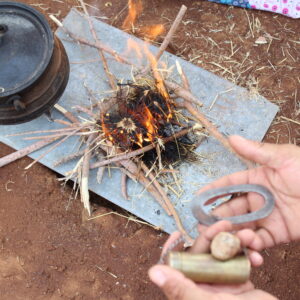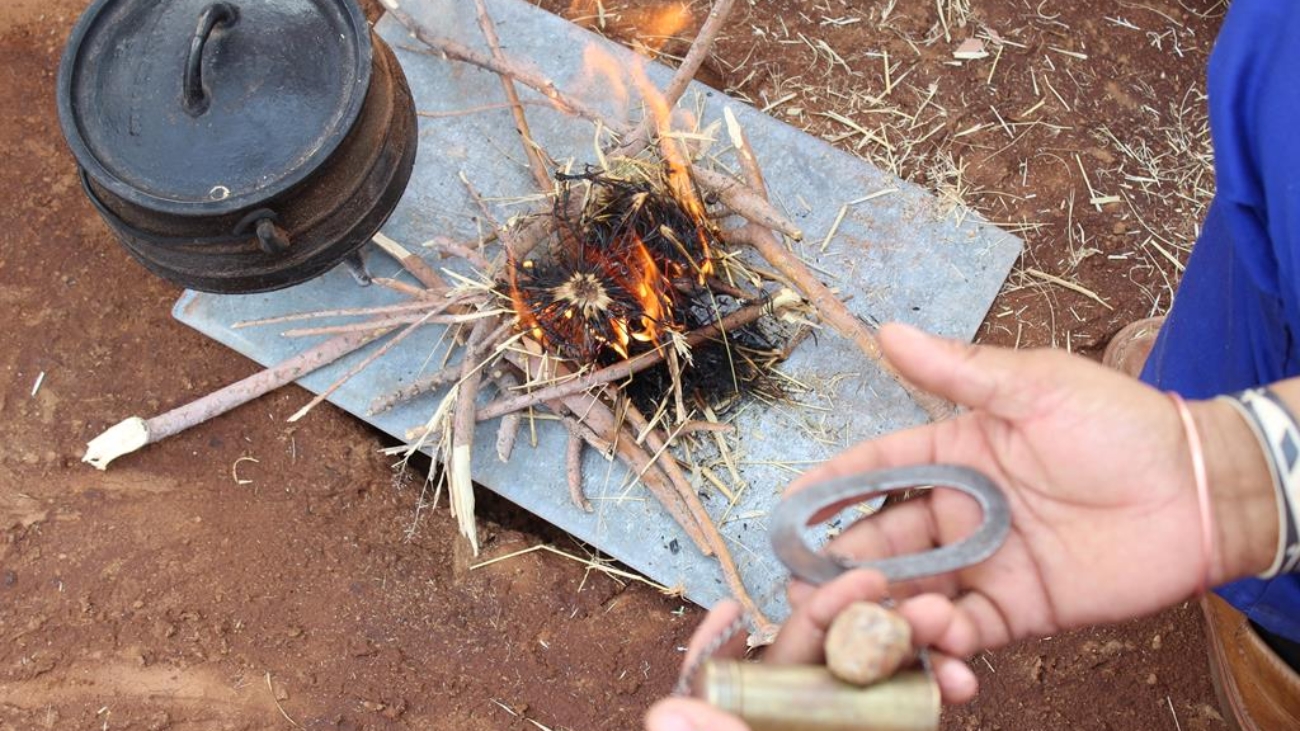Narrated by Chief David Hanse:!Khara-Khoen Clan
&
Ms. Martha Plaatjies
Lighting the morning fire is the most important activity for the Nama people and it is the first thing done in the morning before anything else. The fire place is mostly constructed and beautified with cow dung.
The importance of fire is that, it is a sign of life at home and it is used to prepare food for the day. Fire is also a symbol of love. In the past, lighting the fire in the morning was a man’s responsibility and the woman would then make tea and cook.
The men were also the bearer of the fire lighter. The lighter that was used in the past comprises of a round brass metal tube, metal steel ring and a round stone. When the metal ring is stricken against the stone, it set off sparks which then fall into the tube containing a highly flammable substance. Then one can blow the spark in the container to produce fire.
 When a man is done lighting the fire, women can then start with their tasks of preparing meals. They however start by first spreading dry faeces of an Aadwolf (Earth Wolf) before placing the pot on the fire. The reason for doing that, is to keep the fire alive and to have good luck in the household.
When a man is done lighting the fire, women can then start with their tasks of preparing meals. They however start by first spreading dry faeces of an Aadwolf (Earth Wolf) before placing the pot on the fire. The reason for doing that, is to keep the fire alive and to have good luck in the household.
After doing that, women can then boil water to make tea or coffee. The fire for the Nama people is mostly lit on top of a metal sheet. While waiting for the water to boil, they prepare a traditional bread under the metal sheet. The dig a small hole underneath, put burning charcoals in the hole and spread them evenly in the hole to for the bread to bake on all sides. One can then spread a bit of flour on the charcoal to prevent the bread from collecting ashes from the wood. That hole is also used to roast meat especially for the shepherd when they are from the field. This traditional bread is very delicious and is mainly eaten when people are looking after sheep. To make it tastier, the spread fat processed from cow milk.

In the past, the elders also uses the Aardwolves (Earth wolves) faeces known locally as /ni-xau. They are used for different purposes mostly as medicine. Sometimes these faeces are used when one of the cattle or goat is missing, they are then broken off into small pieces, mix them with coarse salt, spread them on the edge of the fire and cover them with charcoal. This is done with a belief that it prevents carnivores from attaching the lost livestock. This practice is believed to be practical because the Aardwolves will lose the desire to attack the livestock. The lost animals will then return back home safely.
/ni-xau is also used as treatment for stomach upsets, bloated stomach, vomiting or low appetite. To prepare this as medicine, you need to put boiled water in a metal cup and add /ni-xau. You can then put the cup on a burning charcoal and bring it to boil. The reason for boiling it, is to extract the required medicine. One can also bite a piece from the dry /ni-xau when not feeling well. It taste like mint sweets. In the past, when a field worker get a headache, he will take two bites of the dry /ni-xau, chew on it, suck and swallow the saliva. They would then feel better. Women can also crush it nicely, take out all the particles and sniff it, it gives a fresh sensation and relieves headaches.

The Chief indicated that, this kind of knowledge is very important and it need to be shared more especially with children. Men need to know their responsibilities for making the early morning fire but the afternoon and evening fire is set by women. The evening fire is important because it is the time when elder women teaches girls on the significance and danger of the fire. Fire can cause a lot of damages, it can destroy houses and the environment. It therefore need important to teach children not to play with fire.
To preserve all this information for future generations, there is a need to organise cultural activities at National level and at schools, where children are taught about the importance of culture. The fire use to be praised in the past that “fire, you can make me teary but I will not abandon you, you will always remain supreme. The fire is our cultural strength and is very valuable.

